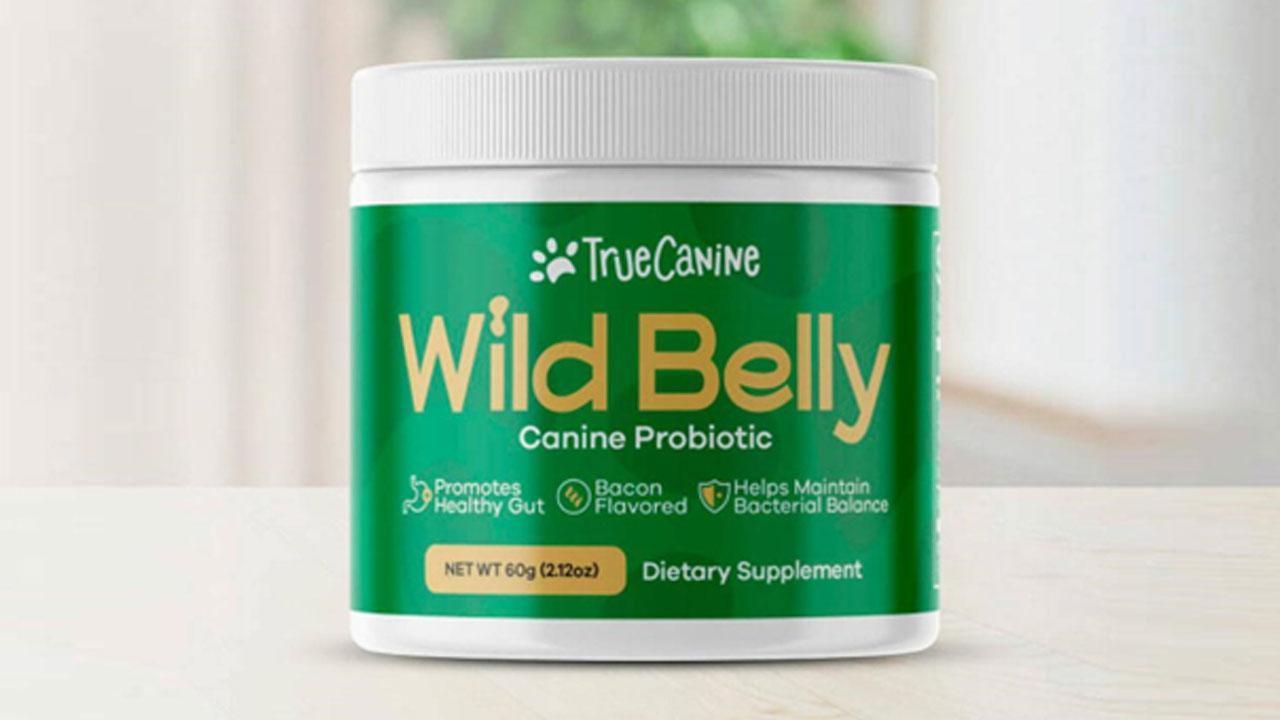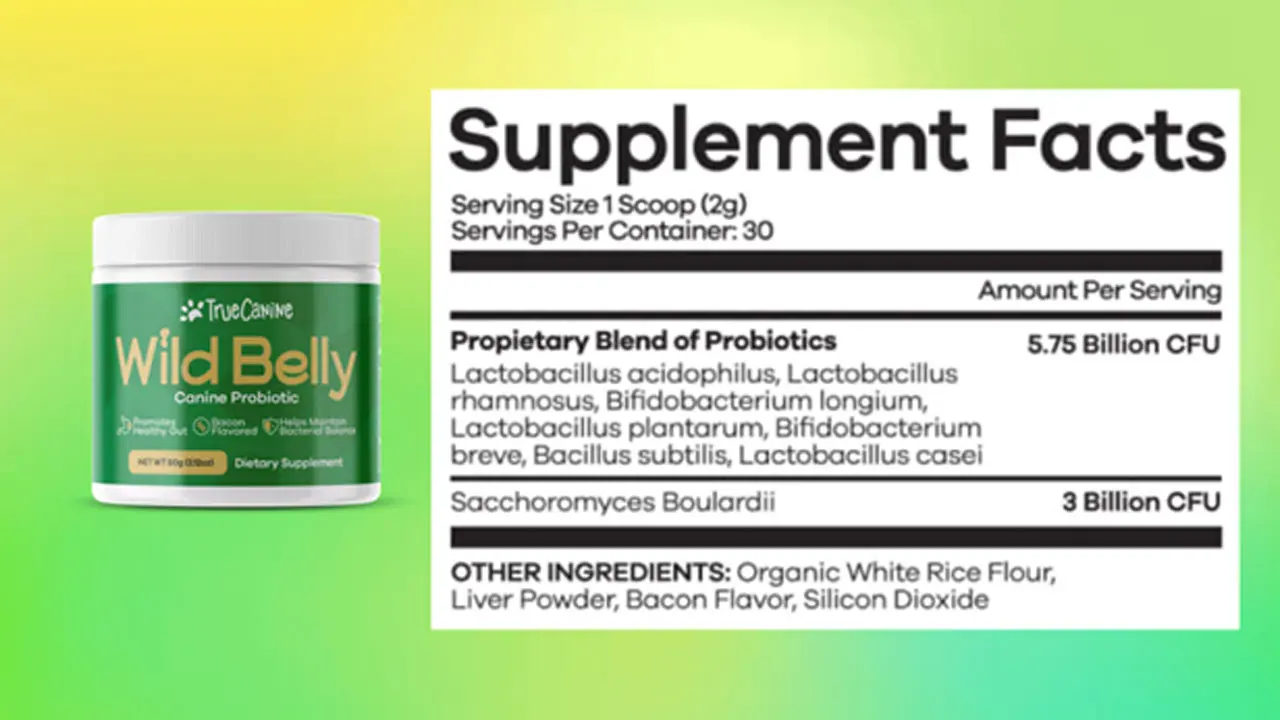Unlock the key to canine anti-aging with Wild Belly Dog Probiotic. Support your dog's health and well-being using a natural method backed by scientific research.

Every dog owner knows the joy and companionship their furry friends bring to their lives. However, just like us humans, dogs can face various health challenges that impact their well-being and behavior. Allergies, joint pain, shedding, anxiety, and aggression are just a few examples of issues that can affect our beloved pets. But what if there was a solution that could address these problems and help our dogs live their best lives?
ADVERTISEMENT
In the quest for optimal canine health, many pet owners have turned to Wild Belly Dog Probiotic. This supplement has gained attention for its ability to target the root cause of health issues in dogs—the gut.
In this article, we will delve deeper into the benefits of Wild Belly Dog Probiotic and explore how it can address the health challenges faced by dogs.
What is Wild Belly Dog Probiotic?
Wild Belly Dog Probiotic is a specially formulated supplement designed to support the health and well-being of dogs. This probiotic supplement focuses on optimizing the methylation process in dogs' bodies. This is a crucial biochemical process that controls cell function and facilitates healthy aging. By addressing this process, Wild Belly aims to provide dogs with the support they need to live longer, healthier lives[1]
Wild Belly Dog Probiotic is the brainchild of Mark Reese, a dedicated researcher with 23 years of experience in cellular health in mammals, specifically focusing on anti-aging. He was motivated by his own personal experience and a deep passion for improving the well-being of dogs. Hence, Wild Belly was born, as a tribute to his beloved dog Lacey.
Lacey's health struggles and eventual passing inspired Mark to delve into the world of canine health and explore ways to optimize dogs' overall vitality and longevity. Recognizing the crucial role that gut health plays in overall well-being, Mark set out to create a probiotic supplement.
With his extensive cellular health knowledge, Mark aimed to develop a formulation that would support optimal methylation and folate production in dogs. By harnessing the power of probiotic bacteria, he sought to restore balance to the gut microbiome and promote a strong immune system response in dogs.
Click to Buy Wild Belly Dog Probiotic on the Official Site!
Notable Facts About Wild Belly Dog Probiotic
|
Form
|
Powder |
|
Primary Active Ingredients
|
L. plantarum, B. longum, L. casei, L. acidophilus, L. rhamnosus, B. breve, B. subtilis, and Saccharomyces Boulardii. |
|
Ingredient Purity
|
100% |
|
Benefits
|
Supports digestive health Promotes a healthy gut microbiome Enhances nutrient absorption Boosts immune system function Supports overall well-being in dogs |
|
Safety
|
Manufactured by a reputable brand |
|
Price
|
$49/ Bottle |
|
Category Average Price
|
- |
|
Amount
|
- |
|
Dosage
|
Sprinkle ½, 1, or 2 scoops in your dog’s food once a day |
|
Purchase
|
How Does Wild Belly Dog Probiotic Work?
Wild Belly Dog Probiotic supports dogs' overall health by promoting the methylation process. It contains specific strains of healthy bacteria that help produce folate in the dog's gut, offering various health benefits.
The included probiotic strains, such as L. plantarum, B. longum, and Saccharomyces Boulardii, work together to optimize methylation. They’re also meant to support cellular health. They can also provide benefits like a strong immune system, healthy joints, skin and fur, good digestion, and a balanced mood[2].
Wild Belly's bacon-flavored formula makes it easy to give to dogs. Just sprinkle it on their food, and they'll happily consume the probiotic supplement. For best results, the manufacturer recommends that you use Wild Belly consistently for a period, adjusting based on the severity of the dog's symptoms.
What Are the Key Ingredients in Wild Belly Dog Probiotic?
The key ingredients in Wild Belly Dog Probiotic are:
L. plantarum
This probiotic strain has been shown to support digestive health in dogs. It helps maintain a balanced gut microbiome by promoting the growth of beneficial bacteria and inhibiting the growth of harmful bacteria.
A healthy gut microbiome is essential for proper digestion, nutrient absorption, and overall gastrointestinal health in dogs[3].
B. longum
- longum is known for its immune-boosting properties. It helps strengthen the dog's immune system, making them more resilient against infections and diseases.
Additionally, B. longum supports a healthy gastrointestinal tract by reducing inflammation and promoting the growth of beneficial gut bacteria[4].
L. casei
- casei is beneficial for promoting overall gut health in dogs. It aids in digestion by breaking down food and absorbing nutrients effectively.
- casei also helps maintain a balanced intestinal environment, supporting regular bowel movements and reducing the risk of gastrointestinal issues such as diarrhea or constipation[5].
L. acidophilus
This probiotic strain is particularly useful for dogs with digestive issues. As documented in the Nutra Thrive For Dogs article, L. acidophilus helps restore the balance of beneficial bacteria in the gut, alleviating symptoms of diarrhea, gas, and bloating in dogs. It also promotes a healthy gut lining and strengthens the dog's immune system[6].
L. rhamnosus
- rhamnosus is known for its immune-enhancing properties. By stimulating the production of antibodies and supporting the function of immune cells, L. rhamnosus helps protect dogs from infections and improves overall immune system function. It also aids in maintaining bowel regularity and can be beneficial for dogs with digestive disorders[7].
B. breve
This probiotic strain contributes to gut health by maintaining a balanced gut microbiota. It supports digestion by breaking down complex carbohydrates and promoting nutrient absorption. B. breve also helps strengthen the intestinal barrier, preventing harmful substances from entering the bloodstream and reducing the risk of inflammation[8].
B. subtilis
- subtilis is known for its ability to enhance the immune system in dogs. It stimulates the production of immune cells and supports their activity, helping the dog fight off infections and diseases.
Additionally, B. subtilis produces antimicrobial substances that inhibit the growth of harmful bacteria in the gut, promoting a healthy gut microbiome[9].
SEE ALSO - Nutra Complete Dog Food Reviews | Ultimate Pet Nutrition
Saccharomyces Boulardii
This probiotic yeast is beneficial for maintaining a healthy gut environment in dogs. It helps restore the balance of beneficial bacteria in the gut, particularly during times of stress or after antibiotic use.
Saccharomyces Boulardii supports digestion, reduces the risk of diarrhea, and may help alleviate gastrointestinal issues such as inflammatory bowel disease[10].
Pros and Cons of Wild Belly Dog Probiotic
Pros:
- Manufactured by a reputable brand
- GMO-free
- Contains natural ingredients
- Comes with a 90-day money-back guarantee
- Easy to incorporate in your dog’s regimen
Cons:
- Not suitable for all dogs (consult a veterinarian before use)
- May take time to see noticeable results
Wild Belly Dog Probiotic Customer Reviews
Online reviews are an excellent way to gauge a supplement’s effectiveness. We took on a mission to see what others think about Wild Belly Dog Probiotic. After a successful research, we sampled out the following comments:
“I rescued my dog Thunder from the shelter two years ago. He was always a bit overweight and always seemed tired. Since putting one scoop of Wild Belly into his food each day, I’ve seen some remarkable changes. Not only is Thunder a healthy weight now, but he’s got so much more energy too. The best part though is how much better he is with strangers. He’s not barking or acting crazy whenever we have visitors to the house anymore, and he just seems much less anxious.” - Kayla B.
“I began sharing Wild Belly with my girl Sheeki after she had a knee injury. She’s normally a picky eater but not with this - she loves the flavor. And I have to say that her joints have improved dramatically. I also started giving Wild Belly to my two other dogs, and I’m noticing a big difference in them too. They’re calmer when it’s time to relax, and have plenty of energy when it’s time to go outside and play. I’m especially impressed with the difference it’s made with our 11-year-old boxer - he’s acting like a puppy again!” - Mike R.
“A few months ago I noticed a bald spot on my bulldog. I have no idea what happened, though when I Googled it they said it was seasonal alopecia so maybe that was it? All I know is that he looked awful and I felt terrible. After coming across Wild Belly, I decided to give it a try. I wasn’t sure if it would work, but the difference has been night and day. Within a week some of his fur was growing back, and after a month his coat has never looked better. I’m very impressed.” - Sherly P.
SEE ALSO - Nutra Thrive for Dogs and Cats Review: Ultimate Pet Nutrition
Wild Belly Dog Probiotic FAQs
How should Wild Belly Dog Probiotic be fed?
Wild Belly Dog Probiotic is typically administered orally, either mixed with food or given directly to your dog. The recommended dosage can vary based on your dog's size and specific needs, but generally 1 scoop a day. Consult with a veterinarian for proper dosage guidance.
What is the price of Wild Belly Dog Probiotic?
The discounted price of the Wild Belly Dog Probiotic is:
- 1 bottle for $49 + SMALL SHIPPING FEE
- 3-bottle pack for $117 + Free Shipping
- 6-bottle pack for $198 + Free shipping
What is the return policy for Wild Belly Dog Probiotic?
Wild Belly offers a 90-day money-back guarantee. If you're not satisfied with the product, you can contact their customer support within 90 days of purchase for a refund. Be sure to review the terms and conditions of the return policy for any specific requirements or restrictions.
Who should take Wild Belly Dog Probiotic?
Wild Belly Dog Probiotic is formulated for dogs of all breeds and ages. It can be beneficial for dogs with digestive issues, such as diarrhea or constipation. Those undergoing antibiotic treatment or experiencing stress-related gastrointestinal disturbances can give it a shot, too.
When can I expect to see results from Wild Belly Dog Probiotic?
The timeline for seeing results can vary depending on the individual dog and their specific health condition. Some dogs may start experiencing improvements in digestive health within a few weeks of starting probiotic supplementation. Others, however, may require a longer period. It's important to maintain consistent use and monitor your dog's progress over time.
Who should avoid taking Wild Belly Dog Probiotic?
While Wild Belly Dog Probiotic is generally safe for most dogs, it's recommended to consult with a veterinarian before administering it to dogs with known allergies, immune system disorders, or specific medical conditions. Additionally, pregnant or lactating dogs should also seek veterinary guidance before using any dietary supplement.
Are there any known side effects of Wild Belly Dog Probiotic?
Wild Belly Dog Probiotic is generally well-tolerated. However, in rare cases, dogs may experience mild gastrointestinal discomfort, such as gas or bloating, when first starting probiotic supplementation. If you notice any unexpected or concerning side effects, it's advisable to consult with a veterinarian.
Conclusion
Wild Belly Dog Probiotic appears to be a promising dietary supplement for dogs. It offers numerous potential benefits for their digestive health and overall well-being.
With its blend of natural probiotics, it aims to support a healthy gut microbiome and improve nutrient absorption. It also aims to boost the immune system and alleviate gastrointestinal issues.
The positive reviews and testimonials suggest that many dog owners have found value in incorporating Wild Belly Dog Probiotic into their pets' daily routine.
As always, it's important to consult with a veterinarian before introducing any new supplement to your dog's diet.
Reference
- Genome-wide DNA methylation analysis in canine gastrointestinal lymphoma: https://doi.org/10.1292/jvms.19-0547
- Effects of Saccharomyces boulardii Supplementation on Nutritional Status, Fecal Parameters, Microbiota, and Mycobiota in Breeding Adult Dogs: https://doi.org/10.3390/vetsci9080389
- Effects of probiotics on gut microbiota: Mechanisms of intestinal immunomodulation and neuromodulation: https://doi.org/10.1177/1756283X12459294
- The power of probiotics: https://www.vet.cornell.edu/departments-centers-and-institutes/riney-canine-health-center/health-info/power-probiotics
- The Effects of Nutrition on the Gastrointestinal Microbiome of Cats and Dogs: Impact on Health and Disease: https://doi.org/10.3389/fmicb.2020.01266
- Perspectives and advances in probiotics and the gut microbiome in companion animals: https://doi.org/10.5187/jast.2022.e8
- Microbiota and probiotics in canine and feline welfare: https://doi.org/10.1016/j.anaerobe.2015.04.002
- Deciphering the Bifidobacterial Populations within the Canine and Feline Gut Microbiota: https://doi.org/10.1128/AEM.02875-19
- Oral Application of Recombinant Bacillus subtilis Spores to Dogs Results in a Humoral Response against Specific Echinococcus granulosus Paramyosin and Tropomyosin Antigens: https://doi.org/10.1128/IAI.00495-17
Disclaimer: The views and opinions expressed in this sponsored article are those of the sponsor/author/agency and do not represent the stand and views of Mid-Day Group.Mid-Day Group disclaims any and all liability to any party, company or product for any direct, indirect, implied, punitive, special, incidental or consequential damages arising directly or indirectly from the use of this content.
 Subscribe today by clicking the link and stay updated with the latest news!" Click here!
Subscribe today by clicking the link and stay updated with the latest news!" Click here!










